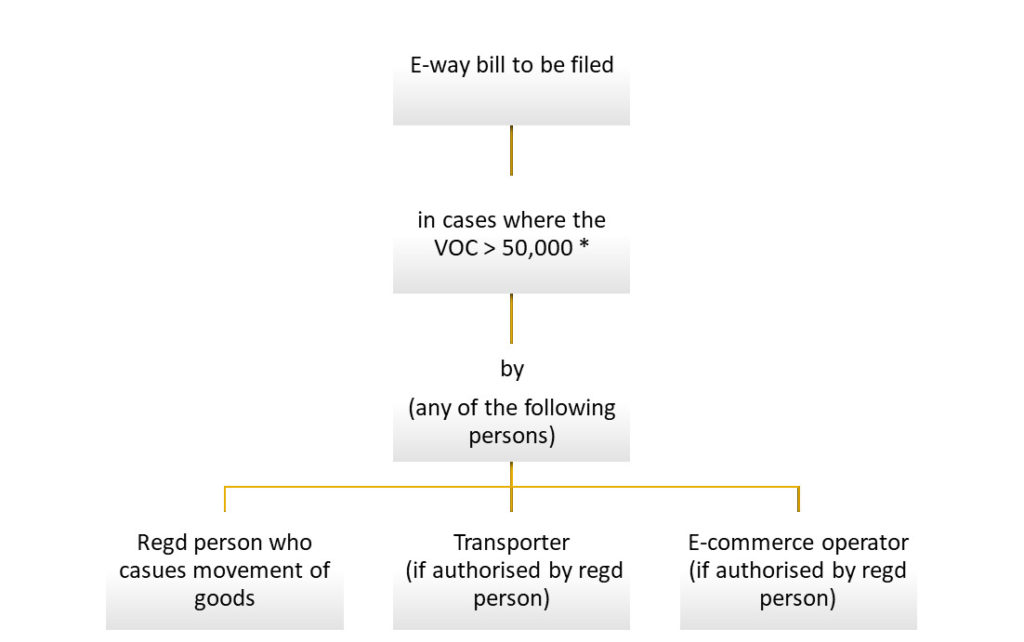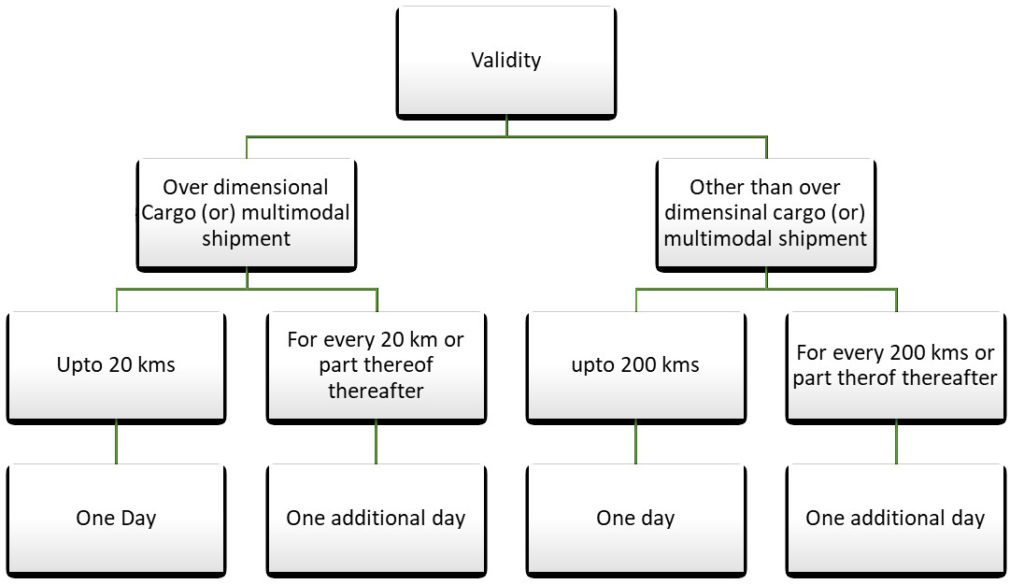E-WAY BILL
1. What Is An E- Way Bill?
- It is an electronic way bill (EWB) for the movement of goods from one place to another place without which goods cannot be transported.
- A unique E way Bill Number (EBN) is allocated, when a EWB is generated and is made available to the supplier, recipient, and transporter.
2. When Is An E-Way Bill Required?

VOC (Value of consignment) > 50,000 condition not applicable in the following cases:
- Interstate supply by principal to job worker
- Interstate transfer of handicraft goods by a person exempted from obtaining registration.
3. What Is Value Of Consignment (VOC)?
Value of consignment = Value declared in invoice (or) bill of supply (or) delivery challan
Includes,
CGST, SGST, IGST, UTGST, cess
Excludes,
Value of exempt supply
Parts Of E-Way Bill And Their Applicability:
- Transport by road, railways, air or vessel – Part A and Part B of Form GST EWB 01 required before movement of goods,
- Furnishing of Part B is exempt only in the following cases,
- Goods handed over to transporter for transportation where the distance between place of business of consignor to the place of business of transporter is upto 50 kms.
- Transfer of goods from one conveyance to other conveyance where the distance between the place of business of transporter to the place of business of the consignee is upto 50 kms.
- Furnishing of Part B is exempt only in the following cases,
Assignment Of E-Way Bill Number (EBN):

NOTE: If the details have been updated by the assigned transporter, assignment of EBN to another transporter not allowed
Consolidated E-Way Bill:
- If there are multiple consignments to be transported in one conveyance, the transporter can furnish a consolidated E-way bill in Form GST EWB 02 by indicating the serial numbers of all the e-way bills.
4. What Happens When The E-Way Bill Is Generated But The Goods Are Not Transported?
- In such a situation, the generated e-way bill should be cancelled within 24 hrs of generation.
- However, the e-way bill cannot be cancelled if it has been verified in transit
Validity Of E-Way Bill

Non Applicability Of E-Way Bill:
- When the below-mentioned goods are being transported E-way bill is not required :
- Liquefied petroleum gas for supply to household and non-domestic exempted category (NDEC) customers;
- Kerosene oil sold under PDS;
- Postal baggage transported by Department of Posts;
- Natural or cultured pearls and precious or semi-precious stones; precious metals and metals clad with precious metal (Chapter 71);
- Jewellery, goldsmiths and silversmiths wares and other articles (Chapter 71);
- Currency;
- Used personal and household effects;
- Coral, unworked (0508) and worked coral (9601)
- Further, E-way bill is not required for the following,
- Transport of alcoholic liquor for human consumption, petroleum crude, high-speed diesel, petrol, natural gas or aviation turbine fuel.
- Goods & services not treated as supply under Schedule III of the Act.
- Empty cargo containers
- Supply of goods by Canteen Stores Department to unit run canteens and authorised customers.
- Supply of heavy water and nuclear fuels.
- Transport of goods by a non-motorised conveyance (Eg. Horse carts or manual carts)
- Goods transported from the port, airport, air cargo complex and land customs station to an inland container depot (ICD) or a container freight station (CFS) for clearance by Customs
- Goods transported under customs bond from inland container depot (ICD) or a container freight station (CFS) to port, airport, air cargo complex and land customs station or from one customs station or customs port to another customs station or customs port
- Goods transported under the customs supervision or customs seal
- Goods being transported are transit cargo from/to Nepal or Bhutan.
- If goods are transported to a weighbridge within 20 kms and back to the place of business covered under a Delivery Challan (DC).
- Transport of goods by rail, where Government or local authorities is the consignor.
- Goods transported to/from the Ministry of Defence.
- Other goods as maybe notified.